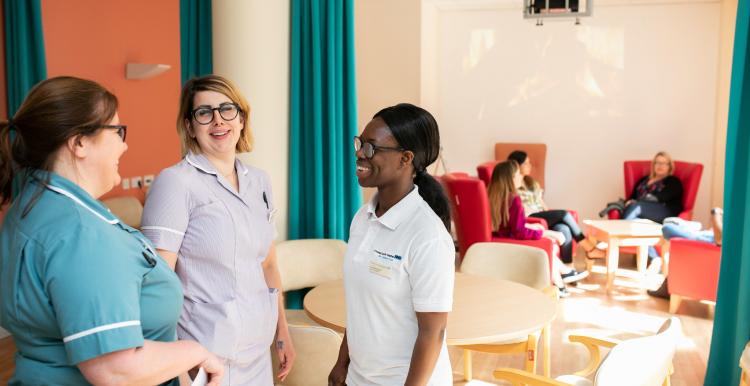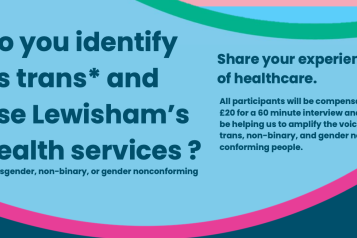Lewisham health services during coronavirus (COVID-19)

Coronavirus (COVID-19) has increased pressure on health services due to the number of people being tested and treated.
Health services may put more resources into managing COVID-19 to respond to this pressure and reduce their service in other areas, while still providing care to people that need it most. This means that your care might be affected.
Lewisham and Greenwich NHS Trust
Updated: 8 April 2022
General guidance to protect patients and staff
- Please continue to wear a face covering in all Lewisham and Greenwich NHS trust hospitals and clinics, unless clinically exempt.
- Those without face coverings who are not clinically exempt are not allowed to visit COVID-19 areas or intensive care units to prevent the spread of infection in high-risk areas.
What to do for your appointment
- Wear a face covering or mask - please ask staff for a single-use mask if you do not have one
- Wash your hands
- Stand a safe distance away from other people and staff, if possible
- Do not bring other people with you to your appointment unless they are helping you with mobility or communication
What to do if you're a visitor
- Do not go to a Lewisham and Greenwich NHS trust hospital or clinic if you have any symptoms of COVID-19
- If you have symptoms and are unsure what to do, please follow the guidance set out here.
- Follow the same mask, hand washing and social distancing procedures as patients
- Limit the number of personal belongings you bring
- Remove your outer clothing, such as a jacket or coat, and roll up your sleeves before coming into the ward
Guide for visitors
Inpatient
- Adult inpatients may have two named visitors, and only one named visitor at the patient's bedside at one time
Pregnant women and birthing partners
- One birthing partner will be allowed at antenatal clinics, during labour and in the maternity ward, including the postnatal ward
- Both parents, or the mother and their chosen partner, can visit babies in the Neonatal Intensive Care wards
Children's wards
- Both parents can visit children in inpatient and paediatric wards
Critical Care Intensive Care Units
- Patients in critical care will be permitted visitors in exceptional circumstances - you must speak to staff to agree on the number of visitors and when visits can happen
End-of-life care
- Patients who are nearing the end of their lives can have up to four visitors, if safe to do so
Patients with disabilities or specific care needs
-
Please speak in advance to the relevant Ward Manager, Matron or Head of Nursing to agree visiting arrangements for patients with specific care needs. This includes arranging visits for:
- Patients with dementia, learning disabilities or mental health needs
- Patients who are in distress or who require an interpreter
- Patients whose health is deteriorating due to isolation
Please note, if visitors are required to carry out a lateral flow device test, it will be provided by the ward.
If you cannot visit, you can use video or phone calls to contact your loved ones by calling the nurse in charge to arrange contact or you can send a free patient postcard greeting.
King's College Hospital
Updated: 8 April 2022
General guidance to protect patients and staff
- DO NOT go to a King's College Hospital if you have symptoms of COVID-19 unless you need emergency or urgent care, or if you are in labour.
- Wear a face covering
- Wash or santise your hands regularly
- Stay two metres apart from other people where possible
- Follow all posted signs that tell you where to walk, wait and queue safely
- Walk on the left in main corridors
- Use the stairs rather than the lifts, if possible
What to do for your appointment
- Arrive no earlier than 10 minutes before your appointment time
- Do not bring other people to your appointment, if possible, unless you are a frail patient who needs assistance, a disabled patient or someone with a learning disability, or you are a pregnant woman attending scans or are in labour.
Planned (elective) treatment
Inpatients
- Planned, non-urgent inpatient care and surgeries are going ahead as normal
- King's College Hospital will arrange for you to have a COVID-19 test done approximately three days before your admission date
Outpatients
- Face-to-face appointments are only available in urgent cases that cannot be managed by video or phone
- For all appointments, you will be contacted to determine how and when your appointment will happen.
- If you have not been contacted within 24 hours of your appointment, please assume your appointment has been cancelled and King's College Hospital will reach out to you to reschedule your appointment
Maternity services
If you have registered with King's for your maternity care, you can stay up-to-date on all relevant information, guidance and support with BadgerNet Maternity Notes Portal.
- King's College Hospital is offering the following options to give birth, depending on your preferences and risk level:
- at home
- in the midwife-led suite at King's College Hospital
- at the birth centre at Princess Royal University Hospital (PRUH)
- on a labour ward
- If you test positive for COVID-19 or are isolating when you have an appointment or need to be seen for any reason, please contact one of the below numbers to report your positive result and get advised accordingly
- The telephone assessment line at King’s College Hospital on 020 3299 8389
- The labour line at PRUH on 016 8986 4189
Guide for visitors
Inpatients
- From 23 February 2022, all adult inpatients can have two visitors per day, although this may vary by department
- Visiting is available from 2:00 p.m. - 8:00 p.m. every day
Pregnant women and birthing partners
- Pregnant women are allowed to have two birth partners
- If you are a birth partner, you must bring everything you need because you cannot re-enter the ward once you leave
- For postnatal and antenatal wards, one support person is allowed
- Please note: the mother and their baby are treated as one in the Neonatal Unit, so the other parent of the baby can visit at any time
Children
- Both parents can visit children who are inpatients in paediatric wards
Critical care
- You will work together with the critical care team in advance to agree on how many visitors are permitted and what visitation looks like
End-of-life care
- Patients who are nearing the end of their lives can have up to four visitors, if safe to do so
Patients with disabilities or specific care needs
- Patients with specific care needs, such as Dementia, learning disabilities or mental health needs, and those who are in distress or are deteriorating because of isolation can have visitors for extended periods of time
- Please speak with the ward leader, matron or head of nursing for the area in which they're being cared for
If you cannot visit, you may use phone, email, Skype, FaceTime, WhatsApp, the King's drop off and collection service, and a Letters to Loved Ones email service.
South London and Maudsley NHS Trust (SLaM)
Updated: 8 April 2022
Mental Health crisis line
If it's an emergency or you need urgent help:
- Call 999 or go to accident and emergency services
If you need urgent help, but it's not an emergency:
- Call 080 0731 2864 to speak to a local, 24-hour mental health crisis line
- Interpreters can be provided
- Call Solidarity in a Crisis at 030 0123 1922, out-of-hours peer support service for Lambeth, Lewisham and Southward
- Monday to Friday, 6:00 p.m. - 12:00 a.m. (midnight)
- Saturday and Sunday, 12:00 p.m. (noon) - 12:00 a.m. (midnight)
- Get help from NHS 111 online or call 111
- There may be significant delays when calling 111
- Get tools to help yourself cope during a crisis from mental health charity Mind
Appointments
While COVID-19 restrictions are lessening and it has been acknowledged that face-to-face contact is essential for recovery when possible, many appointments are still being offered by video and telephone.
Check your appointment letter or Register for Beth to find out how your appointment will take place.
Remote appointments
- Have a quiet and private space to talk
- Be sure your phone or device is charged or near charging point
- If it’s a video call, be sure your device's wifi is on
- If it’s a video call, if possible, have a phone handy as a backup
In-person appointments
- Don't arrive more than 10 minutes early for your appointment
- Clean your hands with sanitiser when you arrive
- Wear a face covering - one will be provided if needed
- If you are exempt from wearing a mask, please call the number on your appointment letter so staff can arrange other safety measures
- If you are deaf or hearing impaired, we might use clear masks and visual aids such as writing things down, speech to text apps and sign language can be used
- Respect social distancing guidance during your visit, including while you are with your clinician
- Attend your appointment alone, unless you have assistance or communication needs
Please do not attend your appointment if you have COVID-19 symptoms (a high temperature, a new continuous cough, a loss of sense of taste or smell) or if you or your family are self-isolating.
GP services in Lewisham
Updated: 8 April 2022
Doctors in Lewisham are asking patients not to put off contacting their GP surgery if they need to consult a doctor or nurse.
Fewer patients have been consulting their doctor or nurse for their usual health concerns or new physical or mental health problems during this pandemic. This is concerning doctors, as there may be people out there who need medical advice and whose conditions may worsen.
South East London CCG is encouraging all Lewisham residents to download the free ASK NHS GP app to any mobile device.
The app features an interactive symptom checker which helps you find the right healthcare at the right time, whether that’s NHS 111, your GP appointment or accident and emergency, it also provides great advice on how to stay well and self-care.
Dental treatment
Updated: 8 April 2022
There are less available appointments for NHS General Dental Services due to social distancing and infection prevention requirements in light of the COVID-19 pandemic.
Most dental practices are open and able to safely provide a full range of treatments but are having to prioritise patients with urgent need and delayed treatments over routine and non-urgent dental care.
All patients should call their dental practice if seeking dental care. The practice will then either provide advice or make an appointment if treatment is necessary. If the practice has availability and the issue is not urgent you may be offered a routine appointment, though this will vary from practice to practice based on their capacity and existing patient need.
If you think you need urgent dental treatment, do not go to a dentist. Instead:
- call your dentist
- use the NHS 111 online service if you cannot contact your dentist or you do not have one

